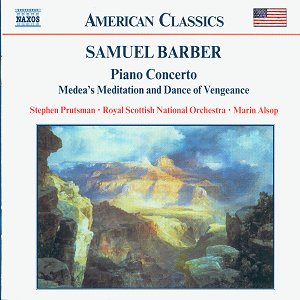From the start, Barber’s Piano Concerto
was composed on the large Romantic scale. It was written for John Browning
who gave the first performance and made the first recording of the work
This recording was first released on the EPIC label during the LP era
and reissued years later on CBS/SONY. The first movement opens with
a big cadenza stating the main themes which are then developed at length
in the course of this fairly long movement. The leading theme of the
second movement is stated by the flute, thus betraying the movement’s
origin. Most of it is based on a slightly earlier Elegy
for flute and piano. The final Rondo opens with a brash, brassy gesture
giving way to some forceful, energetic writing. A slower section relieves
the accumulated tension. The music regains considerable impetus and
finally rushes to an abruptly assertive conclusion. For many years,
I lived with Browning’s old recording; and, in spite of his dedicated
advocacy, I have always felt that this was Barber’s weakest concerto.
The present performance by Stephen Prutsman, whom I remember as a finalist
of the 1991 Queen Elisabeth Competition, has drastically put the balance
straight again.
Die Natali is a free fantasy based on
several fairly well-known Christmas carols, with many unexpected variations
of the tunes. The scoring is Barber at his very best, at his most inventive.
Curiously enough, this lovely work has remained rather neglected, and
is still rarely heard or recorded. It has once been recorded by Jorge
Mester conducting the Louisville Orchestra (available on ALBANY TROY
021-2). Serviceable as Mester’s reading may have been, this one is definitely
better: excellent playing and splendid recording.
Medea Op.23 (and not Op.29 as
stated on the back cover) has had a chequered history. This ballet score,
for Martha Graham, was written for small orchestral forces similar to
those of Copland’s original version of Appalachian Spring.
(Recordings of both scores in their chamber version have been – and
may still be – available on KOCH.) It then bore the title of The
Cave of the Heart, though it was first performed in 1946 as The
Serpent Heart. The original title was reinstated in 1947 and later
changed to Medea when Barber reworked the score into a seven-movement
suite. Later still, in 1944, Barber compressed three movements from
the suite into one single movement under the title of Medea’s
Meditation and Dance of Vengeance Op.23A heard here. This is
a satisfying piece of music in its own right though the suite is still
more satisfying. Incidentally the suite was recorded many years ago
by Howard Hanson and is now available in recent recordings (NAXOS 8.559088,
which I have not heard so far, and KOCH 3-7010-2, which I have). In
any case, Medea – in any guise – is one of Barber’s major
works in which he considerably enlarged his musical and emotional palette
and in which he wrote some of his darkest and most violent music. This
is a long way from the beautifully lyrical Violin Concerto or the wonderful,
nostalgic Knoxville.
The present release ends with the rousing Commando
March composed in 1943 when Barber was already busy working
on his Second Symphony, and originally scored for wind band, but heard
here in the orchestral version made by the composer.
This, the fourth volume of Naxos’s ongoing Barber series,
is one of the finest so far. Excellent performances in fine recordings
that serve the music well. A splendid release, unreservedly recommended,
and my Disc of the Month in any case.
Hubert Culot


